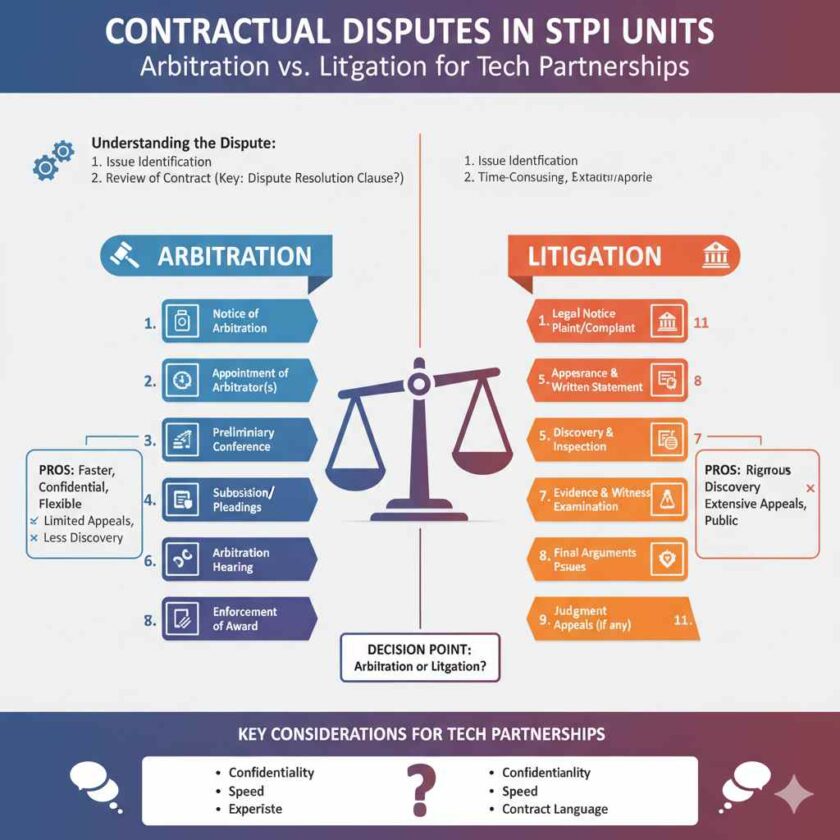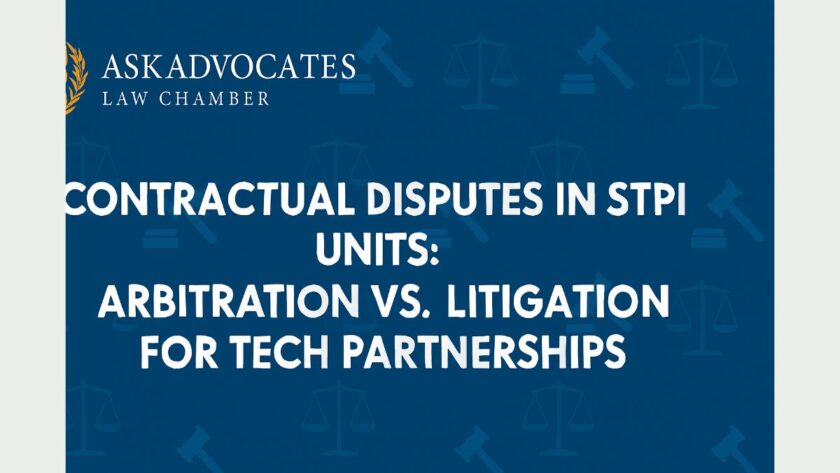In the fast-paced world of technology and innovation, Software Technology Parks of India (STPI) units have become a crucial part of the country’s digital ecosystem. These units play a major role in driving exports, promoting innovation, and supporting start-ups and tech giants alike. However, as tech collaborations expand, so do the chances of contractual disputes. These conflicts often arise from disagreements in partnership terms, intellectual property rights, service delivery, or payment obligations.
When such disputes occur, businesses face an important decision: Should they resolve the conflict through arbitration or litigation? Understanding the difference between the two can save time, money, and relationships. At Ask Advocates Law Chamber, we guide STPI units and tech firms across India and abroad in choosing the best legal path — one that protects their business interests while ensuring compliance with Indian law.

Contractual Disputes in STPI Units: Arbitration vs. Litigation for Tech Partnerships: Ask Advocates Law Chamber
Understanding Contractual Disputes in STPI Units
A contractual dispute arises when one party fails to fulfill its contractual obligations or when both parties interpret the agreement differently. In STPI units, these disputes can involve:
- Breach of partnership or collaboration agreements
- Non-payment or delayed payment for software services
- Violation of intellectual property clauses
- Breach of confidentiality or data-sharing terms
- Disagreements over revenue-sharing or profit distribution
- Non-performance of obligations within the agreed time frame
Since STPI units operate under a framework governed by both Indian contract law and specific STPI guidelines, disputes here often require legal expertise to balance business practicality with regulatory compliance.
The Importance of Dispute Resolution in Tech Partnerships
Every successful tech partnership rests on mutual trust and clear communication. Yet, despite best intentions, misunderstandings can occur. Dispute resolution, therefore, is not just about ending conflict — it’s about protecting relationships and business continuity.
In technology ventures, where innovation and collaboration are essential, prolonged disputes can slow down operations, impact reputation, and even deter investors. That’s why businesses in STPI units must have well-drafted dispute resolution clauses in their contracts.
These clauses typically specify whether disputes will be handled through arbitration, litigation, or other alternative dispute resolution (ADR) methods. Choosing the right path early on can make a significant difference later.
Arbitration: A Flexible and Confidential Approach
Arbitration is one of the most preferred methods of resolving contractual disputes in technology partnerships, especially within STPI units. It offers flexibility, confidentiality, and speed, making it suitable for tech companies that value privacy and efficiency.
Key Features of Arbitration:
- Neutral Forum: Parties can choose neutral arbitrators with expertise in technology and commercial law.
- Confidential Proceedings: Unlike court cases, arbitration hearings are private. This ensures that sensitive business information remains secure.
- Flexible Procedure: The process can be customized — parties can select the language, location, and timeline.
- Final and Binding Decisions: The arbitral award is binding on both parties and enforceable under the Arbitration and Conciliation Act, 1996.
- International Recognition: Awards are often recognized globally, which helps when foreign partners are involved.
Arbitration works particularly well for STPI units engaged in cross-border collaborations, where multiple jurisdictions are involved. It helps avoid complex foreign litigation and ensures a smoother settlement.
Litigation: The Traditional Legal Path
On the other hand, litigation refers to the formal process of resolving disputes in court. It follows strict procedures under the Code of Civil Procedure (CPC) and other relevant laws. While it may be slower and more public, it still has advantages in certain cases.
Key Features of Litigation:
- Public and Transparent: Court proceedings are open and part of the public record.
- Judicial Authority: Decisions are made by judges who have the power to interpret laws and enforce them through official mechanisms.
- Appeal Rights: If one party is dissatisfied, there is a structured appeal process available.
- Suitable for Complex or Fraudulent Cases: Litigation is ideal when there are allegations of fraud, criminal breach, or issues requiring judicial scrutiny.
However, litigation often takes years, involves higher costs, and exposes business details to the public. For tech companies that value discretion and speed, this can be a major drawback.
Comparing Arbitration and Litigation
To decide between arbitration and litigation, it helps to compare their main characteristics:
| Aspect | Arbitration | Litigation |
|---|---|---|
| Speed | Generally faster | Often lengthy |
| Cost | Moderately expensive but efficient | Can be very costly due to prolonged proceedings |
| Confidentiality | Private and secure | Public record |
| Control | Parties have control over procedure | Governed by court rules |
| Enforceability | Easily enforceable in India and abroad | Binding only within jurisdiction |
| Appeal | Limited or no appeal | Multiple appeal levels |
| Expertise | Arbitrators can be subject experts | Judges may not have technical expertise |
From this comparison, it becomes clear that arbitration offers more flexibility, while litigation ensures stronger judicial oversight. The right choice depends on the nature of the dispute, relationship between parties, and commercial goals.
When Should STPI Units Choose Arbitration?
Arbitration is often the preferred route for tech-based contractual disputes, particularly in STPI settings. It is most suitable when:
- Both parties want to maintain long-term business relations.
- The dispute involves technical or intellectual property issues.
- Confidentiality of business data is crucial.
- The parties are located in different countries.
- They want a faster and cost-effective resolution.
For example, if an STPI-registered software company has a licensing dispute with a U.S.-based partner, arbitration provides an effective, neutral, and internationally recognized solution.
When Litigation Becomes Necessary
Litigation becomes inevitable when:
- There are serious allegations of fraud, coercion, or misrepresentation.
- One party refuses to comply with an arbitral award.
- The contract does not have a valid arbitration clause.
- The dispute involves public law elements or statutory compliance.
- Enforcement of rights requires judicial authority (like injunctions or asset freezing).
In such cases, litigation under the Indian legal system offers the power and enforcement strength of the judiciary. It ensures compliance through formal court orders and legal remedies.
The Role of Well-Drafted Contracts
Many disputes arise not because of bad intent, but because of poorly drafted contracts. In tech partnerships, where terms can be complex, clarity in contract drafting is essential.
At Ask Advocates Law Chamber, we always emphasize the inclusion of:
- Clear scope of work and deliverables
- Defined payment schedules and penalties
- Confidentiality and IP ownership clauses
- Jurisdiction and governing law clauses
- Dispute resolution clauses specifying arbitration or litigation
A well-drafted contract serves as the first line of defense against potential disputes. It can minimize misunderstandings and guide parties toward the most efficient resolution method.
The Legal Framework for Arbitration in India
Arbitration in India is governed by the Arbitration and Conciliation Act, 1996, which aligns with the UNCITRAL Model Law to ensure global compatibility. The Act promotes party autonomy, allowing flexibility in procedures.
Recent amendments to the Act have made arbitration even more efficient by:
- Imposing timelines for award completion
- Promoting institutional arbitration
- Encouraging the establishment of Arbitration Councils
- Allowing the use of electronic communication and hearings
For STPI units, these reforms mean that arbitration is now faster, more predictable, and better aligned with international practices.
The Growing Trend: Arbitration in Tech Sector
In India’s evolving tech ecosystem, arbitration is increasingly viewed as the preferred dispute resolution mechanism. With digital transformation and global partnerships, STPI units are realizing that arbitration offers:
- Global enforceability of awards
- Reduced legal complexities
- Quicker outcomes
- Privacy for business secrets and data
This trend is further strengthened by India’s push toward becoming a global arbitration hub, with centers like Mumbai, Delhi, and Chennai offering world-class arbitration facilities.
How Ask Advocates Law Chamber Helps
At Ask Advocates Law Chamber, we specialize in helping STPI units, tech startups, and multinational companies navigate contractual disputes with precision and care.
Our team of experienced commercial lawyers and arbitration experts ensures that every client receives a strategic and practical solution. Whether through arbitration or litigation, we aim to protect your rights, minimize risks, and achieve justice efficiently.
We assist clients in:
- Drafting and reviewing technology contracts
- Structuring effective dispute resolution clauses
- Representing clients in domestic and international arbitrations
- Handling complex litigation involving STPI and IT laws
- Enforcing arbitral awards in Indian courts
With our deep understanding of both technology law and commercial litigation, we provide solutions that align with your business goals — not just legal theory.
Frequently Asked Questions
Contractual disputes in STPI units often arise due to disagreements over payment terms, software delivery delays, data confidentiality breaches, or intellectual property ownership. Sometimes, unclear contract clauses or misinterpretation of partnership terms lead to conflicts. These issues can strain business relationships if not resolved through structured legal mechanisms like arbitration or litigation.
Arbitration is preferred because it offers speed, confidentiality, and flexibility. Parties can choose expert arbitrators familiar with technology and commercial laws. It also allows private hearings, keeping sensitive business data secure. Moreover, arbitral awards are legally binding and recognized internationally, making them ideal for STPI units dealing with global partners.
Litigation is advisable when there are allegations of fraud, criminal misconduct, or breaches requiring judicial intervention. It’s also suitable when one party refuses to honor an arbitral award or when the contract lacks a valid arbitration clause. Courts can issue binding orders and enforce rights through formal legal channels.
A well-drafted contract defines obligations, timelines, payment terms, and dispute resolution methods clearly. It minimizes confusion and sets out procedures for handling disagreements. Including specific arbitration or jurisdiction clauses helps both parties know where and how disputes will be settled, reducing costly delays.
Ask Advocates Law Chamber provides expert legal support for STPI units and tech partnerships. The firm helps draft strong contracts, represent clients in arbitration or litigation, and ensure compliance with Indian and international laws. Their goal is to protect clients’ rights, preserve partnerships, and deliver swift, effective justice.
Conclusion
In the world of STPI units and technology partnerships, contractual disputes are almost inevitable. However, what truly matters is how they are resolved. Arbitration and litigation both have their merits. Arbitration offers speed, confidentiality, and flexibility, while litigation provides judicial authority and enforceability. Choosing the right path requires a deep understanding of law, business strategy, and commercial relationships.
At Ask Advocates Law Chamber — The Best Global Force in Legal Defense, we believe that every dispute can be turned into an opportunity for stronger collaboration and legal clarity. Our mission is simple: to protect your rights, preserve your partnerships, and ensure justice is served swiftly.
Read More
- Challenging or Defending GST Advance Ruling Orders: Legal Strategies and Remedies
- How the Special Valuation Branch (SVB) Impacts Transfer Pricing and Import Valuation – Legal Helpline
- Analyze recurring tax conflicts, GST refund delays, and litigation pathways for disputed exemptions
- Resolving Tax Disputes Under STPI: Navigating Section 10A/10B Challenges
- Top 5 Compliance Mistakes in STPI Registration and How to Avoid Penalties
- Software Technology Parks of India (STPI) Scheme – Official Website



